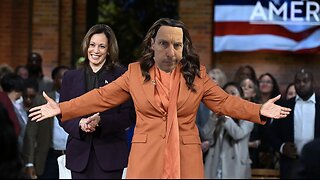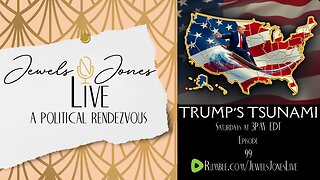Premium Only Content

World Leaders Do You Know the History of Palestine?
ONE DEMOCRATIC PALESTINE, FROM THE RIVER TO THE SEA
https://odsi.co/en/#faqS
https://x.com/ODSinitiative
Help Impoverished Children Study with Less Than $1 a Day
https://www.launchgood.com/v4/campaign/support_an_entire_community_of_learners_for_less_than_1_a_day
https://www.healpalestine.org/
https://www.pcrf.net/
https://www.ummarelief.org/ur-campaigns/fundbhhmwmp
https://partners.getmoredonations.org/campaign/gaza/FUNJWAFMNHT/
https://donate.miresiperboten.org/help_yemen46918443
=
THE INTERVIEWERS NEVER HAVE THE GUT TO ASK THE RIGHT QUESTION LIKE AFTER STEALING THE LAND OF THE PALESTINIANS WHERE WILL THE PALESTINIANS GO?
BEN GURION REPLIED “KILL THEM ALL”!!!!!!! IN TIME TO COME THE CHILDREN WILL FORGET WHAT HAD HAPPENED TO THEM.
IN PRIMARY 4 MS SOLOMAN TAUGHT US TO SING THE SONG "THIS LAND IS MINE AND GOD GAVE THIS LAND TO ME" SO I ASKED MS SOLOMAN IF PALESTINE BELONGED TO ISRAEL THEN WHERE SHOULD THE PALESTINIANS GO AND YOU KNOW WHAT SHE TOLD ME? SHE SAID, "SHUT UP"AND WE CONTINUED TO SING THE SONG.
CAN'T YOU SEE WHAT SATANYAHU IS DOING IN GAZA AND NOW LEBANON IS GENOCIDE AND NOT WAR!! THE ZIOPIGS SAID LEBANON IS NOT A STATE WHICH MEANS THEY HAVE THE RIGHT TO BOMB THEM. BUT ISRAEL IS NOT A LEGITIMATE STATE TOO INSTEAD IS A TERRIOST STATE SO ARE WE GOING TO KILL THEM ALL LIKE WHAT THEY DID TO THE PALESTINIANS AND THE LEBANESE?
From: Sun Wah Chong <sunwahchong@gmail.com>
Date: Mon, Oct 7, 2024 at 10:32 PM
Subject: She can't face or accept the truth that Rotschild had stolen Palestine!!!!!
To: <marketing@triggerpod.co.uk>
Israel Wants to Make This the Last War - Melanie Phillips
https://www.youtube.com/watch?v=lpylVjt-jwQ
After watching it for about 10 min I could not take it anymore and I have to speak my mind!!
Here is the true fact of Palestine
https://rumble.com/v5hrgth-world-leaders-do-you-know-the-history-of-palestine.html
1948: Why the name Israel?
https://scholar.harvard.edu/files/martinkramer/files/1948_why_the_name_israel.pdf
Most people had thought that the state would be called Judea (Yehuda in Hebrew). But Judea is the historical name of the area around Jerusalem, which at that time seemed the area least likely to become part of the state. Also, it applied only to a very small territory. So Judea was ruled out.
Now from Benjamin Fulford the Satanic forces are negotiating to change the name of Israel to Judea and they believe the Palestinians will accept such arrangement, what utter rubbish!!
https://eraoflight.com/2024/10/09/benjamin-fulford-report-israel-ends-and-us-civil-war-begins/
MI6 sources report that in response to the devastation and the threats to vaporize Israel, high-level Jewish power brokers are trying to negotiate the replacement of the Satanic state of Israel with the God-affiliated new state of Judea. This will include both the native Judeans and the immigrant Jews. This new state will be allowed to rebuild the Temple on its’ original location which is nowhere near the Al Aqsa Mosque. So yes, that qualifies as biblical-scale news.
=
PLEASE SHARE - ROTCHILD ZIONISM HAD STOLEN PALESTINE
8 October 2024
WOKE UP STILL MAD SO I DID MASS SHARING ON FACEBOOK AND THE EVIL ZIOPIGS BLOCKED IT.
BROTHERS AND SISTERS,
I NEED YOUR HELP TO SHARE THIS ARTICLE BECAUSE IT IS VERY CRUCIAL FOR THE WORLD TO KNOW HOW THE WEST HAD STOLEN PALESTINE … YOU KNOW WHAT YOU NEED TO DO NEXT…OK?
Replies from Facebook World Leaders Do You Know the History of Palestine?
https://rumble.com/v5i4n7x-replies-from-facebook-world-leaders-do-you-know-the-history-of-palestine.html
=
What the Jewish Talmud says about Babies, Jesus, Blacks, and Christians
https://www.youtube.com/watch?v=-m8ER7zZT-0
Talmudic Rabbis Don't Want Gentiles To Know
https://www.youtube.com/watch?v=_rGoWSJCZ5E
AllHailSeizure90
Having someone come out and willingly talk about this openly with no fears is refreshing. Subbed.
sensui11
I wonder how many Americans know that they’re currently living in Weimar 2.0… if you aren’t familiar with the Weimar Republic, I highly recommend you research it. The parallels between it and modern day America are very disturbing.
KTFPaul
I'm absolutely horrified.
Maybes that explains where the missing children go each year.
And why Hellywood was so against 'the sound of freedom ' movie.
I knew there was blasphemous themes in those books but......
Prayers and blessings for you and your family brother Bryan.
God bless 🙏✝️🙌✝️🙌🕊️
=
Greater Israel And The Destruction Of Medina
https://www.youtube.com/watch?v=9XEI3-uSId0
MUHAMMAD (ﷺ) PREDICTED THIS ISRAEL-PALESTINE WAR?!
https://www.youtube.com/watch?v=vhgBsdMqKgs
sunwahChong
The ZIOPIGS greater Israel plan include Saudi Arabia!!
=
The REAL ORIGINS of Saudi Royal Family 🇸🇦
https://www.youtube.com/watch?v=Ima_Fam_v-I
tanveerpasha
The British and French helped start the "Arab Revolution" a few Arabs joined the revolution demanding freedom from the Ottoman Turks. The British spy often known as " Lawrence of Arabia” was a mediator. The British and French promised freedom to the leaders of the Arab revolution and promised them power. However, after defeating the Ottoman Turks the British and French double crossed the leaders of the Arab revolution and gave the power to the "Saud Dynasty" who followed in the highly controversial scholar "Abdul Wahab Al Najdi" who inturn followed the most controversial scholar of his time "Ibn Taymiyah”. After the Saud Synasty came to power they renamed the country to "Saudi Arabia”. The Wahabi ideology started spreading into most Islamic countries. The western countries promoted the Wahabi idealogy into Pakistan and Afghanistan to radicalize people to form the mujahideen and to defeat the Soviet Union when the Soviet invaded Afghanistan.
=
Saudi Arabian & Hashemite (Jordanian) Royal Family Trees
https://www.youtube.com/watch?v=2i-eHLNT18Y
sunwahChong
Saudi family are Coptic Jews. MBS wants to transform Saudi Arabia into Dubai where sinful acts are the norm.
When I was living in Abu Dhabi in late 70s we often said that the West has taken over Dubai but for sure Saudi Arabia will not fall into the trap of Capitalism.
My Syrian friend told me there was no way the West can divide Syria because they are a multi-racial society living in harmony. Look now once you have a ZIOINIST in the picture everything will be turned upside down.
ES-fr3yz
Whatever the case, their actions speak for themselves and so far they've been 100% pro-Israel.
sufiyansheikh
May Allah protect all the Muslims from hypocrites.
dalhaanu
This explains why they're not helping Palestine.
In the Quran Allah Says: "Among the people are those who say, “We believe in God and in the Last Day,” but they are not believers." Quran 2:8
=
Greater Israel Explained: The Israeli Plan to Conquer the Arab World
https://www.youtube.com/watch?v=NEYEcAd-tzQ
ibeemeeintp
Welcome to the "Now i know about the greater Israel project" club folks...... Once you learn it you can't UNLEARN it......
lydiamiceli
There are no words to describe my hatred and condemnation for the apartheid Zionist regime of Israel and its people.
=
Famous Historian EXPOSES ISR*EL’S FACTS! | Isr*el’s Future In The Quran!
https://www.youtube.com/watch?v=UfcwqmWND3Y
javierortegaarrayga
Hi, wow, I got 2000 years of education in less than an hour. I do appreciate it so much, it's great to have a different and honest point of view and truth telling.
As a catholic, I feel terrible never studying the Muslim religion, but I'm glad that those few I had interacted with were so kind that blow my heart, they made me feel as one of them in no time and I learned from their kindness. ❤
=
[Untold Story]: How the West Stole Democracy from Palestine, Lebanon, and Syria
https://www.youtube.com/watch?v=kFXrX1867wA
علىخطىالعرب-خ6ت
The video makes a strong point: there should be no borders between Arab countries, as these divisions were imposed by the West, mainly by the UK and France. The colonial powers carved up the Arab world, stripping away its unity. The creation of Israel also played a major role in destabilizing and fragmenting the region, further harming Arab unity. Had the West not interfered by dividing the Arab nations and introducing an occupying force like Israel, the Arab world could have been united as one, potentially like a collection of kingdoms—such as the Kingdom of Syria or the Kingdom of Hijaz—that once existed. This region, rich in culture and history, was devastated by Western colonialism and occupation. Greetings from Saudi Arabia 🇸🇦❤️! Thanks you for telling the world the truth!
sunwahChong
I was searching for a video supporting my claim that the West betrayed the Arabs and lo and behold God sent to me on the phone.
=
The Ethnic Cleansing of Palestine: An In-Depth History | The War Myth & Jordan's Betrayal
https://www.youtube.com/watch?v=hW2FwBRvOZI
https://www.youtube.com/watch?v=C3cnRcfp_us
https://www.youtube.com/watch?v=yC8NCCt2KSE
https://www.youtube.com/watch?v=ehp9PZo4UR0
https://www.youtube.com/watch?v=-z0fJNP_BH0
malekahmedtamimi
The sad part is the guy who is singing in the intro died as a refugee and never went back to palestine. His name is abu arab. The song is called haddi ya bahar meaning calm down o sea.
supernovabrightstar
when the oppressed resist the oppressor they are called terrorist. Palestine and Palestinians are a great example for us to witness in our lifetime. Down with the US, Britain and European countries that participated in the genocidal atrocities committed against the Palestinians. Thank you so much for creating such eye opening videos. Free Palestine!!!!!!!
=
During the Great War of 1914-1918, the Ottoman empire, which included Palestine, fought alongside Germany and Austria-Hungary against the Allies. That made the Holy Land enemy territory from the British perspective, and Britain took the lead in conquering it. When the war ended, the victorious Allies divided the formerly Ottoman Near East into new political units. In April 1920, they assigned to France the mandate to govern Syria, including Lebanon. They assigned two mandates to Britain, one for Mesopotamia (now Iraq) and one for Palestine. Borders for the three territories were not yet defined.
How did British Mandate Palestine get its borders? The line in the north emerged from Anglo-French negotiations in 1923. The one in the south was fixed by treaties in the mid-1920s between Britain and the new nation of Saudi Arabia. The border between Mandate Palestine and Mandate Mesopotamia was of little immediate importance, given that it was in the middle of an uninhabited desert and Britain controlled both sides. That line was finally fixed through an exchange of letters in 1932.
What particularly interests us here is how Britain handled Eastern Palestine. The short answer is that it remained under the British Mandate for Palestine until 1946, when it became the independent kingdom of Transjordan, later renamed Jordan. Western Palestine remained under the Mandate until May 1948.
The longer answer requires us to go back to World War I.
In November 1917, the British government issued the Balfour Declaration, a promise to help create in Palestine a Jewish national home. The promise, motivated by a combination of strategic and moral considerations, was controversial, including within the government.
As Britain (with a small bit of help from French forces) was conquering Palestine and Syria, its military commander, General Edmund Allenby, chose to view Eastern and Western Palestine as distinct areas. A practical man, he had no interest in Jewish nationalism, nor any sympathy for it. In 1918, he combined Transjordan and inland Syria into a military occupation zone that Britain allowed the Arabian Emir Faysal to administer from Damascus. Allenby assigned Palestine west of the Jordan to a different occupation zone, with its own military government based in Jerusalem.
Allenby hoped Faysal would reign over a Syrian kingdom that included Transjordan. That would give London influence over the whole area, as Faysal was understood to be Britain’s man. But French leaders were hostile to Faysal, and, when they took control of Damascus in July 1920, they ousted him. (Britain soon consoled Faysal with the kingship of Iraq.) British officials, not wanting France to control Transjordan, quickly made clear that Transjordan was not part of French Mandate Syria.
What, then, should be done with Transjordan? Britain’s high commissioner in Palestine had said it should be recognized as part of Palestine under his supervision. He stressed that it could help Western Palestine meet its future food, water, and electricity needs.
Britain’s new foreign secretary, Lord Curzon, however, disagreed, primarily because of his concerns about the costs of administering Transjordan. At the same time, however, he saw Western and Eastern Palestine as a strategically valuable “land bridge” connecting British Egypt to British Mandate Mesopotamia. His dilemma was how to retain control of that “bridge” while limiting Britain’s responsibilities in Transjordan.
Curzon suggested that Transjordan might be given “some form of independent Arab Government.” One option, he said, was to recognize Transjordan as belonging to Palestine or Mesopotamia. Another was to divide Transjordan between those Mandates. And a third was to leave it “for future arrangement.” Curzon preferred to wait, “leaving the eastern boundary of Palestine . . . for subsequent definition when the situation as regards Arabia has developed further.”
=
In February 1921,Winston Churchill became secretary of state for the colonies and responsibility for the Middle East was transferred from Curzon to him. Churchill promptly devised a set of policies of huge importance and lasting effect. They created kingdoms and put men on thrones. They drew new maps. And, it can be argued, they partitioned Palestine for the first time between Arabs and Jews.
High on Churchill’s agenda was Eastern Palestine. Churchill shared Curzon’s view that an Arab administration of Transjordan could help keep down British expenditures. Churchill also agreed to maintain the ban on Zionist settlement east of the Jordan River—originally put in place by Britain’s military administration, which claimed to lack the resources necessary to protect Jews there.
Zionist leaders argued that Britain should not exclude Transjordan from the Jewish national home. In a communication to a senior British official, the U.S. Supreme Court justice Louis Brandeis said that Palestine needed access to water resources in Transjordan for irrigation and power and also to Transjordan’s “fertile plains . . . for food and sustenance.” (Upon joining the Supreme Court in 1916, Brandeis had resigned his chairmanship of America’s principal Zionist organization, but he remained active in the Jewish national cause.)
The leader of the Zionist Organization, Chaim Weizmann, argued to Churchill that Transjordan, from earliest times, was “an integral and vital part of Palestine.” Its plains were the Holy Land’s “natural granary” and the climate was “invigorating.” The area was “scarcely inhabited and long derelict,” Weizmann said, and severing it from Palestine “would be scant satisfaction to Arab Nationalism, while it would go far to frustrate” Britain’s Jewish-national-home policy. “While Eastern Palestine may probably never have the same religious and historic significance as Western Palestine,” he wrote, “it may bulk much larger in the economic future of the Jewish National Home.”
Churchill knew that it might not be possible diplomatically to arrange a separate British mandate for Transjordan. His staff therefore proposed acknowledging the territory as part of Mandate Palestine—a decision comfortably within the time-honored common understanding that Palestine straddled the Jordan River.
The ban on Jewish settlement in Eastern Palestine, however, created a legal conundrum. How could Churchill maintain the ban when one of the chief duties of Britain, as Palestine’s mandatory power, was to encourage “close settlement by Jews on the land?” Churchill did not buy his staff’s argument that the Mandate, as then drafted, gave Britain the necessary authority. Amending the draft would be awkward, but Churchill feared a legal challenge. He sought help from lawyers. If it were “absolutely necessary” to change the Mandate to keep Transjordan out of the Jewish national home, he wrote, then he wanted the new authority couched in vague language: “to specify areas affected without referring in detail to proposed difference in treatment.”
The result was an artfully muddy amendment that was added to the Mandate as Article 25. It stated, “In the territories lying between the Jordan and the eastern boundary of Palestine as ultimately determined, the Mandatory shall be entitled . . . to postpone or withhold application of such provisions of this mandate as he may consider inapplicable to the existing local conditions.” The words were framed, a senior official explained, to enable Britain “to withhold indefinitely the application of those clauses of the mandate which related to the establishment of a National Home for the Jews.”
After the League of Nations eventually approved the Mandate in 1922, the British representative Arthur Balfour submitted to it a memorandum, citing Article 25, that listed all the clauses about Jews and said they were “not applicable” in Transjordan. Balfour told the League’s governing council that the memorandum’s object was “to withdraw from Trans-Jordan the special provisions which were intended to provide a national home for the Jews west of the Jordan.” France’s representative said he understood that Balfour’s memorandum “only aimed at maintaining in the area to the east of the Jordan the general regime of the Mandate for Palestine.” Balfour said he agreed.
=
On March 23,1921, Churchill had traveled to Jerusalem to persuade Emir Abdullah, Faysal’s brother, to content himself, at least for the time being, with a position in Transjordan. Having decided that Transjordan “should be constituted an Arab province of Palestine under an Arab governor, responsible to the High Commissioner,” Churchill suggested that Abdullah take responsibility there for six months with British help. Abdullah agreed.
Nothing is so permanent as the provisional, the adage says. That six-month arrangement has not ended—it has been in operation for a century. It gave rise to the emirate of Transjordan, which existed under the Palestine Mandate until 1946 and then evolved into the kingdom of Transjordan, which changed its name in 1949 to the kingdom of Jordan, which exists to this day under the kingship of Abdullah’s great-grandson, Abdullah II.
Zionist leaders of all stripes were unhappy with the British government’s policy on Transjordan. Vladimir Jabotinsky would demand reversal of the territory’s exclusion from the Jewish national home, making a rallying cry of the slogan “Two banks to the Jordan—this is ours, and this too.” The words, which rhyme in Hebrew (Shtey gadot la-yarden—zu shelanu, zu gam ken) were from a poem by Jabotinsky that, put to music, became one of the anthems of his political movement’s youth organization.
Although the idea that the Jewish national home should include Eastern Palestine became associated mainly, if not exclusively, with the political right when Jabotinsky’s Zionist Revisionist movement adopted it as a tenet, in 1921 it was a consensus view among Zionists from right to left.
Some British officials likewise looked askance at the Transjordan policy. Colonel Richard Meinertzhagen of the Colonial Office said he “exploded” when he heard Churchill “had severed Transjordan from Palestine.” In his memoir, A Crackle of Thorns, Alec Kirkbride, a British military officer in Transjordan who became Britain’s first ambassador there, commented wryly that, after Britain chose to put Abdullah in charge, “In due course the remarkable discovery was made that the clauses of the mandate relating to the establishment of a National Home for the Jews had never been intended to apply to mandated territory east of the river.” Leopold Amery, a former colonial secretary and one of the drafters of the Balfour Declaration, criticized the Transjordan policy for “taking out of Palestine the larger and better half, the half more suitable to large-scale colonization.” Years later—in a May 22, 1939 House of Commons debate—he described the decision as Palestine’s “first partition.”
In early 1921 Colonial Office officials mulled the question of terminology and proposed that “‘Palestine’ and ‘Eastern Palestine’ should be brought into use for the territories lying respectively to the west and east of the River Jordan.” Their recommendation was only partially adopted. Palestine became the term used for Western Palestine. But the territory east of the Jordan would commonly be called Transjordan.
The common use of “Transjordan” rather than “Eastern Palestine” had consequences. After the 1948-49 Israeli War of Independence, it allowed supporters of the Palestinian Arabs to describe them as “stateless.” After the 1967 Six-Day War, it allowed people to say plausibly, if inaccurately, that the Jews had taken control of all of Palestine, leaving none to the Arabs.
Numerous books—for example, Rashid Khalidi, The Iron Cage: The Story of the Palestinian Struggle for Statehood (2006)—now contain maps that attach the labels “Palestine” or “Mandate Palestine” only to Palestine west of the Jordan. Writing that the Zionists “were ultimately able to take over the entire country,” Khalidi endorsed the common but ahistorical assertion that Palestine extended no further east than the Jordan River. By way of contrast, it is notable that another leading American scholar of Arab origin, Princeton University’s Philip K. Hitti, in his History of Syria: Including Lebanon and Palestine (1951), dealt accurately with this point of geography. After identifying Palestine as “the southern part of Syria,” Hitti wrote that Palestine was “amputated” from Syria, and then, “In 1921 Transjordan, with a biblical name but no real historical existence, was in turn amputated from Palestine and placed under the Emir Abdullah.”
Would the world now perceive the Arab-Israeli conflict differently if British officials had adopted that proposal from the Colonial Office to continue to use the term Eastern Palestine, rather than Transjordan? Would world politics be different if people generally understood that the kingdom of Jordan is in Eastern Palestine and Israel is in Western Palestine? Would the conflict have been different if no one had ever contended that the Palestinian Arabs are “stateless?”
Such questions have been excitedly debated over the years, including within Israel. Early in his political career, Ariel Sharon, who became Israeli prime minister in 2001, made famous the slogan “Jordan is Palestine,” using it to counter demands for Israeli territorial concessions to the Palestinians. Of the various arguments advanced in favor of such concessions, one was that Israel should agree to divide the land it controlled because the Arabs deserved a state in at least part of Palestine. Sharon’s answer was that an Arab state—Jordan—already existed in Palestine.
Sharon’s slogan became a hot button in Israeli politics because it sounded dismissive of concerns about how Israel should deal with the rights of Palestinians living west of the Jordan River. Anyone who heard it that way had good grounds to object. Those concerns are serious and the slogan is not at all the end of the story. But, as much as one might dislike its political implications, the simple statement that Jordan is Palestine is factual.
The distinguished Anglo-American historian Bernard Wasserstein clearly did not like the slogan’s political implications. Rejecting the view of Jabotinsky and Sharon that Palestine was partitioned in 1921 as a “myth,” he wrote, “In fact, what occurred [when Britain decided that Transjordan would be part of the Palestine Mandate, albeit outside the Jewish national home] was a huge addition to the territory of Palestine, not any subtraction.” He added, “Zionist disappointment at the loss of what they had never been promised and never possessed led to the idea that they had been somehow cheated out of their birthright. The legend persists.”
Wasserstein’s point is supported by the view of Allenby and his officers. When they spoke of “Palestine,” they generally meant only Western Palestine. From their perspective, Transjordan’s inclusion in the Palestine Mandate was an addition. But Jabotinsky and Sharon were not wrong. As is clear in any library of books of history and natural history from before the Great War—including, as we have seen, the massive British military surveys of the Palestine Exploration Fund and the widely-read work of the scholar George Adam Smith—“Palestine” had a western part and an eastern part that were separated by the Jordan River. From the viewpoint of the established experts in geography, declaring Transjordan out of the Jewish national home was a subtraction.
Wasserstein’s statement that Transjordan “had never been promised to the Zionists” is true in that it was never explicitly promised to anyone. Britain, however, did promise to help create a Jewish national home “in Palestine,” and all the parties involved understood that the boundaries remained to be specified.
For their part, Zionist leaders and top British officials understood that the word “Palestine” in the Balfour Declaration included Transjordan—in other words, that Eastern Palestine, or at least part of it, was included in the promise to the Zionists. That is clear from the Brandeis and Weizmann letters. It is evident from Amery’s remarks. And it is shown conclusively by Churchill’s agreement to accept Article 25. If the Balfour Declaration had been limited to west of the Jordan, Churchill would not have felt compelled to add in Article 25 to make the Mandate’s Jewish-home clauses inapplicable east of the Jordan.
Wasserstein is correct that the Zionists never “possessed” Transjordan, but it is unclear what that signifies. Jews in ancient times had lived east of the river, but Britain banned the Zionists from settling there.
To sum up: “Palestine” was long universally understood to include the land on both sides of the Jordan River. Eastern Palestine is now the kingdom of Jordan. Its eastern border was not finalized until after the League of Nations approved the Palestine Mandate. Maps of Mandate Palestine that include only Western Palestine are misleading because the emirate of Transjordan was part of Mandate Palestine, governed under Britain’s Jerusalem-based high commissioner for Palestine from 1921 until the emirate became an independent kingdom in 1946. Amery had a firm basis for saying that taking Transjordan out of the Jewish national home in 1921-1922 can properly be called Palestine’s “first partition.”
-
 2:25:04
2:25:04
Matt Kohrs
14 hours agoEXPLOSIVE NEW HIGHS!!! (Bitcoin, Tesla, Coinbase & DJT) || The MK Show
1.34K -
 37:18
37:18
BonginoReport
5 hours agoInside the Neocons' Plan to Thwart Trump (Ep.82) - 11/11/24
121 -
 1:58:06
1:58:06
Jeff Ahern
3 hours agoMonday Madness with Jeff Ahern
1 -
 1:27:53
1:27:53
Game On!
11 hours agoI lost $591,000 on the New York Giants! I HATE THEM!
1542 -
 35:35
35:35
The Why Files
6 days agoThe Dark Side of the Moon | Alien Activity and the NASA Cover-Up
74.9K123 -
 2:39:28
2:39:28
Jewels Jones Live ®
2 days agoTRUMP’S TSUNAMI | A Political Rendezvous - Ep. 99
49.3K105 -
 2:12:46
2:12:46
TheSaltyCracker
16 hours agoLefties Think Elon Stole Election ReeEEeE Stream 11-10-24
223K437 -
 1:16:52
1:16:52
vivafrei
16 hours agoNEW STREAM! Sorry peeps
155K152 -
 5:56:14
5:56:14
SNEAKO
16 hours agoCheesur E-Date, Jake Shields & Myron Gaines on Election
114K8 -
 39:34
39:34
Nerdrotic
18 hours ago $60.21 earnedAirbursts with Dr Malcolm LeCompte & Giants and Ancient Civilizations with Hugh Newman - Forbidden Frontier
123K18